Cloudways vs SiteGround – "This is the close winner!"
When comparing Cloudways and SiteGround, each hosting provider offers unique benefits tailored to different user needs. SiteGround is ideal for those who prefer a more traditional approach, offering a familiar cPanel interface, straightforward management, and reliable customer support. Known for its strong focus on security and ease of use, SiteGround is a great choice for small to medium-sized websites, especially for those new to hosting.
Cloudways, on the other hand, stands out for its flexibility and scalability, appealing to more tech-savvy users. Its pay-as-you-go pricing and the absence of a traditional cPanel make it ideal for developers and larger sites that require high-performance environments. Cloudways also includes advanced caching options, although some users find them challenging to configure.
Ultimately, SiteGround excels in simplicity and support, while Cloudways offers greater control and customization, making it a better fit for complex, resource-intensive websites.
Cloudways
Performance: |5.0|
Cloudways provides excellent performance, especially for resource-intensive websites. It utilizes multiple cloud providers, including DigitalOcean, AWS, and Google Cloud, allowing users to select infrastructure tailored to their needs. Built-in caching options such as Varnish, Memcached, and Redis help boost site speed, though some users find configuration requires technical know-how. Overall, Cloudways’ performance is strong, especially for websites needing high-speed, optimized environments.
Uptime: |4.9|
Cloudways boasts reliable uptime, with cloud infrastructure providers ensuring redundancy and stability. Although Cloudways doesn’t directly offer an uptime guarantee, the platforms it partners with typically maintain an uptime of around 99.9% or higher. For most users, this results in minimal downtime, making Cloudways suitable for businesses that prioritize availability.
Customer Service: |4.8|
Customer support on Cloudways includes 24/7 live chat and ticket support, plus an option to add advanced support plans for faster, more in-depth assistance. Basic support is generally responsive, though complex issues may require the premium support upgrade.
SiteGround
Performance: |4.8|
SiteGround is known for strong performance, especially for small to medium-sized websites. Its use of Google Cloud infrastructure and SSD storage enhances speed and reliability. SiteGround includes proprietary caching solutions, like SuperCacher, which significantly boosts site loading times. With PHP optimization and support for HTTP/2 and QUIC protocols, SiteGround provides consistently fast performance, even under moderate traffic loads.
Uptime: |4.9|
SiteGround offers an impressive uptime guarantee of 99.9%, supported by its proactive server monitoring and custom-built systems that detect and fix issues quickly. This high level of uptime reliability makes SiteGround a solid choice for users needing consistent availability. In practice, users experience minimal downtime, ensuring a stable environment for their websites.
Customer Service: |4.7|
SiteGround is renowned for its excellent customer support, available 24/7 via live chat, phone, and email. Their support team is known for quick, knowledgeable responses, making it easy for users to get help with technical or general inquiries. This emphasis on customer service is a major draw for those who prefer reliable, hands-on assistance.
Overall Comparison Cloudways vs SiteGround
The best hosting choice depends on your specific needs, though each host shines in certain areas regardless of website type. Are you drawn to SiteGround for its intuitive cPanel setup, or would you prefer the flexibility of Cloudways’ pay-as-you-go model, where managing your webspace isn’t as crucial?
If performance is your priority, caching features can significantly speed up your site—but it’s also essential to understand some of the challenges with Cloudways’ caching tools. Hosts sometimes promise more than they deliver, especially in terms of customer support, so I’ve thoroughly researched the quality of Cloudways’ support to give you a clearer picture.
In this expert comparison of SiteGround and Cloudways, I’ll break down six key areas, providing a side-by-side look to help you find the best hosting solution for your needs.
| Feature | Cloudways | SiteGround |
|---|---|---|
| Type of Hosting | Managed Cloud Hosting | Shared, Cloud, and WordPress Hosting |
| Performance | Optimized for speed with cloud infrastructure | Excellent uptime and speed with built-in caching |
| Pricing | Pay-as-you-go, starting at $10/month | Starting at $3.99/month for shared hosting |
| Scalability | Highly scalable on-demand resources | Limited scalability; higher plans for more resources |
| User-Friendliness | Requires some technical knowledge | More beginner-friendly interface |
| Feature | Cloudways | SiteGround |
1. Plans and Pricing
Starting with a new hosting provider should be simple, and Cloudways makes it easy by offering a three-day free trial with no credit card required. As a Platform as a Service (PaaS) provider, Cloudways operates on a pay-as-you-go model. During sign-up, you can select both the type and size of your cloud server from six options, including DigitalOcean, Amazon Web Services (AWS), and Google Cloud Platform (GCP).
As you customize your server type and size, Cloudways displays an estimated monthly price. However, note that the prices shown on the Cloudways pricing page are based on the smallest DigitalOcean server, so your final hosting cost may be higher depending on your chosen server specifications.
| Plan Type | Cloudways | SiteGround |
|---|---|---|
| Basic Plan Price | Starting at $12/month | Starting at $3.99/month |
| Storage | 25 GB (for the basic plan) | 10 GB (for the basic plan) |
| Bandwidth | 1 TB | Unmetered |
| Websites | 1 (per server) | 1 (for the basic plan) |
| Email Accounts | Not included (paid add-on) | Free email accounts included |
| Free SSL | Yes | Yes |
| Backups | Automated backups (daily) | Daily backups included |
| Support | 24/7 live chat & ticket support | 24/7 chat, phone, and ticket support |
| Refund Policy | 3-day free trial | 30-day money-back guarantee |
SiteGround offers straightforward pricing with no surprises. Unlike many hosts that require a two- or three-year commitment for their lowest rates, SiteGround’s quoted monthly price applies with just a 12-month upfront payment, calculated as 12 times the monthly rate, with no hidden fees.
And the Winner Is…
SiteGround. With SiteGround, you get clear, predictable pricing each month. While Cloudways’ pay-as-you-go model provides flexibility, it can lead to significantly higher costs compared to similar plans on SiteGround.
2. Features
Both Cloudways and SiteGround are reliable hosting providers, each offering user-friendly services. While they’re similar in ease of use, they focus on different types of hosting.
Cloudways specializes exclusively in reseller cloud hosting, while SiteGround offers both shared and cloud hosting, with a primary focus on shared hosting.
To help you compare these two providers, I’ve prepared a table highlighting their key features. You can also skip to the final conclusion for a summary of the comparison findings.
| Feature | Cloudways | SiteGround |
|---|---|---|
| Service Types | Managed Cloud Hosting (various providers) | Shared, Cloud, WooCommerce, WordPress hosting |
| Data Centers | Multiple locations via cloud partners (e.g., AWS, DigitalOcean) | Limited locations managed by SiteGround |
| Control Panel | Custom Control Panel | Site Tools (custom cPanel alternative) |
| Scalability | High scalability with cloud provider options | Limited scalability on shared hosting, higher plans on Cloud VPS |
| Performance | Optimized for speed with SSDs, caching layers, and CDN integration | Custom caching, SSDs, and free CDN on higher plans |
| Pricing Model | Pay-as-you-go billing model | Monthly or annual billing, discounts on longer terms |
3. Performance
Cloudways vs. SiteGround Performance
When it comes to performance, both Cloudways and SiteGround are fast and reliable hosts. Although both providers deliver strong results, SiteGround achieved slightly faster response times and more consistent uptime, while Cloudways offered notably quicker loading speeds.
Uptime and Response Time
I monitored each provider over different periods—nearly 6 months for Cloudways and around 2 months for SiteGround. Over 6 months, Cloudways experienced just two outages, which, though significant, led to 41 minutes of downtime and a 99.99% uptime rate.
Despite these outages, a 99.99% uptime is still excellent, especially given that all Cloudways’ server providers guarantee at least 99.9% uptime.
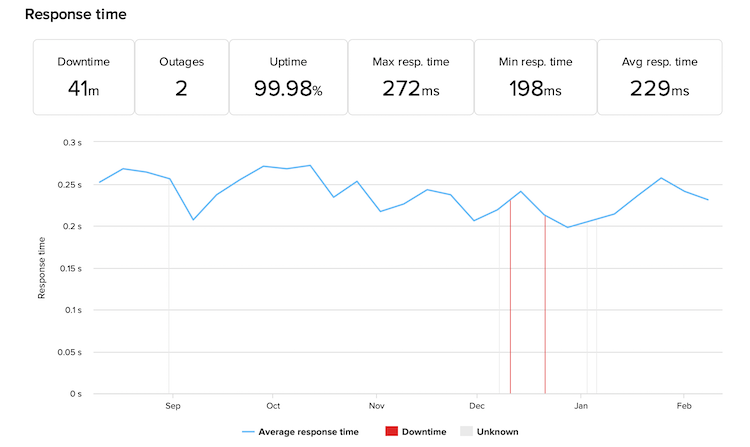
Cloudways’ average response time is particularly impressive at 229ms—less than half the industry average. This speed was achieved on a basic virtual server, which can be further optimized for even better performance.
As for SiteGround, it excelled in shared hosting performance. Over 2 months, it experienced just 3 outages totaling 7 minutes of downtime, resulting in a near-perfect 99.9% uptime, exactly matching its official uptime guarantee. This is a strong performance, especially for shared hosting.
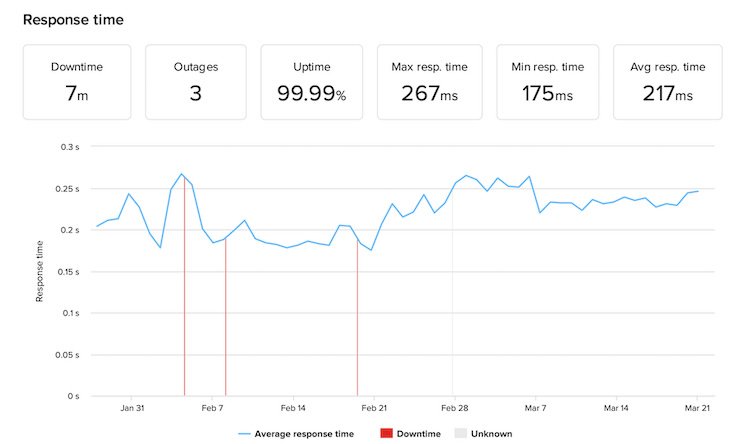
SiteGround’s response time averaged an impressive 217ms—well below the industry average of 600ms.
In summary, both Cloudways and SiteGround deliver reliable and extremely fast performance. However, SiteGround demonstrated a slightly quicker response time and marginally better uptime, which is especially notable given that it’s shared hosting competing against cloud hosting.
Website speed
To ensure a fair comparison, I hosted both sites in the US and conducted my tests from the same location. It’s worth mentioning that both providers have data centers in multiple countries.
Depending on the service you choose, Cloudways offers location options ranging from 8 to 20 different sites, while SiteGround provides 7 locations.
Before diving into the details, let me clarify the key metrics used in this test:
Largest Contentful Paint (LCP): This measures the time it takes for the largest graphic element on the page to load. For better search engine ranking, LCP should ideally be under 2.5 seconds.
Fully Loaded Time: This indicates the total time required for the website to load completely. To enhance user experience and minimize bounce rates, aim for a loading time of no more than 3 seconds.
Now, let’s look at the performance of a fully built website on Cloudways:
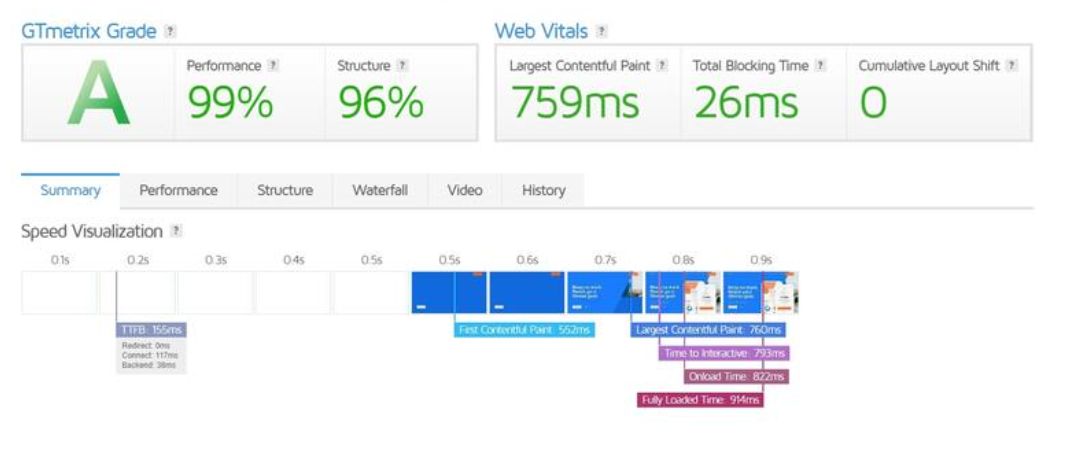
The provider demonstrated itself to be one of the fastest web hosting solutions, achieving an LCP of just 759ms and a Fully Loaded Time of 0.9 seconds. Both of these metrics are well below the 2.5-second mark, showcasing exceptional speed.
As for SiteGround, it also delivered impressive results:
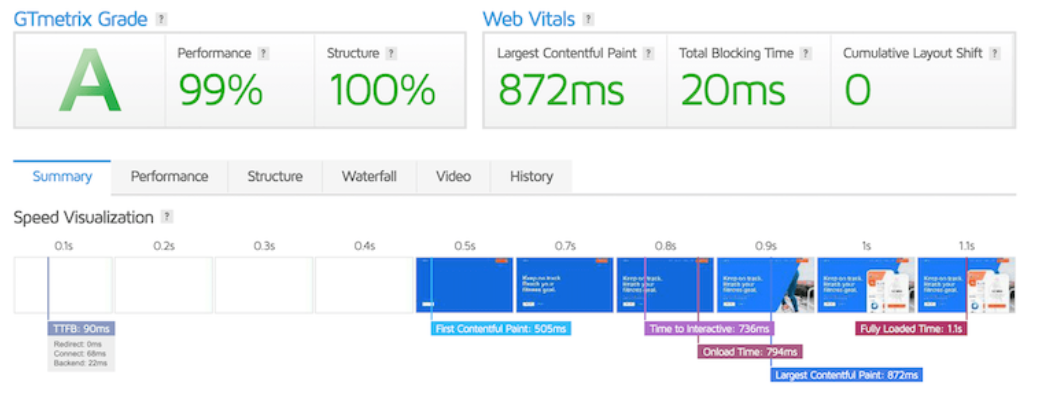
SiteGround achieved a commendable LCP of 872ms and took just 1.1 seconds to fully load, indicating impressive speed—both metrics are well below the thresholds of 2.5 seconds and 3 seconds, respectively.
Overall, SiteGround ranks among the fastest shared hosting providers available. However, given that Cloudways specializes in cloud hosting, it naturally recorded slightly faster page load times, albeit by a narrow margin.
In summary, both Cloudways and SiteGround are reliable and high-performing hosting providers. While SiteGround demonstrated a slight advantage in uptime and response time, Cloudways excelled in loading speed.
4. Ease of Use
Another important aspect of the Cloudways vs. SiteGround comparison is ease of use. Cloudways, as a cloud hosting provider, requires a bit more technical knowledge for management. In contrast, SiteGround is more user-friendly, particularly for those choosing shared hosting, making it more accessible for beginners.
With Cloudways, you’ll be using an in-house management panel that serves as a gateway to a bare virtual server, allowing you to customize it to your liking. While beginners may take some time to acclimate, this process isn’t overly complicated or lengthy. It’s essential to remember that, as a cloud hosting solution, it will naturally be a bit more complex.
The management panel features several key settings, enabling you to easily scale your resources up or down based on your monthly requirements. For more details on how the Cloudways panel operates, consider checking out a comprehensive Cloudways review.
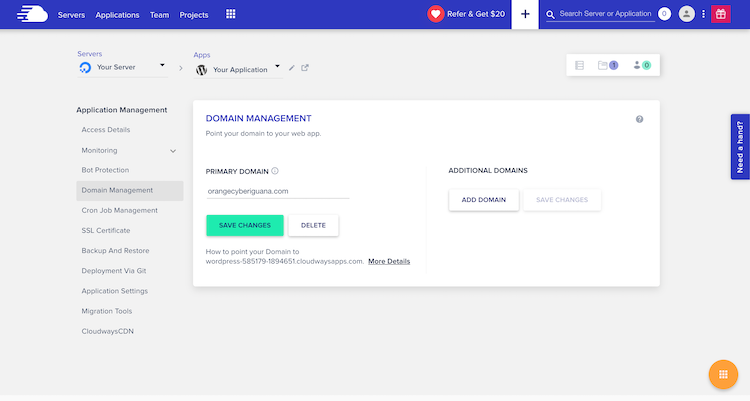
From your Cloudways management panel, you can access various settings, including master credentials, monitoring options, service management, general settings, and backups. For guidance on using these features, you can refer to Cloudways’ knowledge base, which contains all the necessary information.
In contrast, SiteGround offers a more user-friendly experience. Shared hosting services are generally simpler to manage, and SiteGround’s in-house developed control panel is as intuitive as a standard cPanel, making it easy to navigate and use.
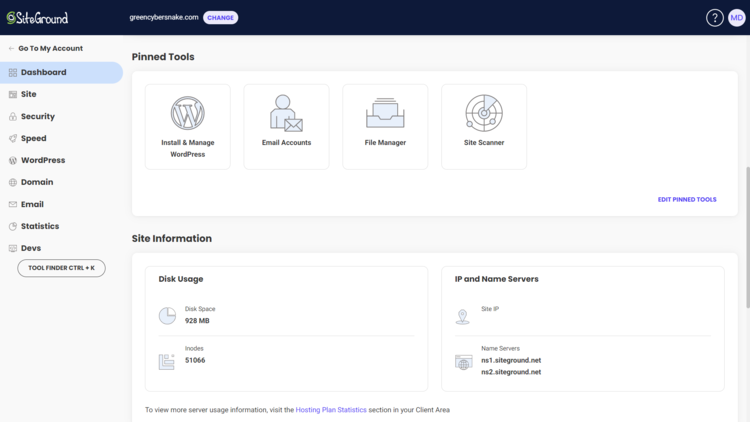
One of the standout features of SiteGround’s control panel is its ability to pin your most frequently used shortcuts at the top of the dashboard. Additionally, you can easily check your remaining disk space each time you log in, which is particularly helpful when managing multiple websites. If you’re interested in learning more about SiteGround’s panel, you can check out the SiteGround review.
On the left side of the menu, you’ll find other settings available in the SiteGround control panel. You can manage site options and security, review statistics, and handle email features, along with options related to domains and WordPress.
In summary, both Cloudways and SiteGround have user-friendly control panels, but SiteGround is more accessible for beginners. The ability to customize the panel to meet your specific needs is an added benefit.
Advantage of Cloudways and SiteGround
| Cloudways | SiteGround |
|---|---|
| Multiple cloud providers for custom scaling. | Managed hosting with optimized solutions. |
| Pay-as-you-go model, no contracts. | Clear tiered pricing with included features. |
| High-performance infrastructure with caching options. | SSD storage and advanced caching for fast loading. |
| 24/7 support via chat and tickets. | 24/7 excellent customer service via chat and phone. |
Disadvantage of Cloudways and SiteGround
| Cloudways | SiteGround |
|---|---|
| Limited server locations may affect latency for global users. | Performance can degrade during peak times due to shared resources. |
| Need greater technical expertise to operate and set up. | Beginners may find the user interface less straight forward. |
| Pricing can escalate with added services and high traffic. | Higher renewal rates compared to initial sign-up prices. |
| Customer support is primarily ticket-based; live chat is limited. | Limited support options on lower-tier plans. |
5. Support
Cloudways Can’t Compete with SiteGround’s Customer Support
When issues arise with your hosting or if a setting change inadvertently disrupts your site, you want to rely on your hosting provider’s support team for assistance.
Cloudways offers 24/7 expert support; however, user feedback indicates that customer service can be lacking, often slow to respond and resolve issues. Additionally, many knowledge base articles are outdated, and support staff frequently direct users to these old resources, creating a frustrating cycle of needing help but being sent back to the knowledge base. Phone support is limited, available only through a callback request, meaning most interactions occur via live chat or email.
In contrast, SiteGround is renowned for its exceptional customer service, often regarded as one of the best in the industry. They provide 24/7 support through phone, live chat, and ticket-based email systems. Response times are quick, especially on live chat, and users can typically expect email replies within about 10 minutes based on my experience.
Furthermore, SiteGround’s knowledge base is extensive, filled with articles and tutorials that help users maximize their hosting experience, whether they are newcomers or seeking to understand advanced features like the SuperCacher tool.
Cloudways customers have reported unsatisfactory experiences with support, including instances where agents refused to assist unless given a five-star rating. While this may not be a common occurrence, my own experiences with Cloudways’ customer service have also been disappointing, with slow live chat response times and difficulty getting agents to fully understand the issues at hand.
And the Winner Is…
SiteGround. With one of the best customer service teams in the hosting industry, SiteGround is tough to beat. They offer multiple ways to reach their expert support team, which is available 24/7, ensuring you’ll receive prompt responses to your inquiries.
While Cloudways makes strong claims about its customer service, user experiences indicate that the service often falls short of these promises. Although the knowledge base contains helpful advice, be cautious, as some articles may be outdated and potentially misleading.
6. Security
SiteGround vs. Cloudways in the Security Stakes
SiteGround prioritizes security to protect your website from spam, hacking attempts, and data loss. They provide automated daily backups stored for 30 days, making it easy to revert your site if changes lead to issues. The Easy Restore tool allows you to restore your website in just a few clicks.
SiteGround also features unique account isolation on shared hosting plans, ensuring that if one account is compromised, the security of other accounts remains intact. Their servers are monitored around the clock by both personnel and the Guardian automatic monitoring system.
The anti-hacking systems receive regular updates to patch vulnerabilities promptly, while custom security patches are implemented proactively by the development team. An artificial intelligence-based anti-bot system and a customized web application firewall (WAF) are used by SiteGround to stop security risks before they can access your website.
In comparison, Cloudways utilizes OS-level firewalls to filter out malicious attacks and provides security patching for the operating system of your server to mitigate vulnerabilities. Although Cloudways takes security seriously, it offers fewer measures than SiteGround.
While you can set up automatic backups for your server and applications with Cloudways, these backups are not free—the cost increases with the frequency of backups. Cloudways charges per GB of backup storage, with backups retained for a maximum of 28 days.
Additionally, Cloudways uses a crowdsourced approach to identify vulnerabilities through BugCrowd and collaborates with the Debian community for operating system security and patching. They also have an application isolation system to ensure that issues affecting one application don’t compromise the entire server.
| Security Feature | Cloudways | SiteGround |
|---|---|---|
| SSL Certificates | Free SSL certificates via Let’s Encrypt | Free SSL certificates via Let’s Encrypt |
| Firewalls | Web Application Firewall (WAF) integrated | Managed security with AI anti-bot system |
| Malware Scanning | 24/7 monitoring and automated malware removal | Daily backups with on-demand restore options |
| DDoS Protection | Cloud-based DDoS protection | DDoS protection included |
| 2-F Authentication | Supports 2FA for added account security | Supports 2FA for added account security |
| Backup and Recovery | Automated backups (manual for free plan) | Daily backups and restore points included |
And the Winner Is…
SiteGround. Although this round in the comparison of SiteGround vs. Cloudways is closely contested, SiteGround edges out the competition. Both hosts offer similar security options, but SiteGround’s free automatic daily backups provide greater peace of mind. You receive backups at no extra cost, and the restore process is much more straightforward with SiteGround, as Cloudways does not offer automatic restore tools.
Cloudways falls short due to its charges for backups. The pricing structure means that daily backups stored for four weeks can be more expensive than weekly backups retained for just one or two weeks, making it necessary to back up less frequently to keep costs down.
Final Recommendations
| Feature | Cloudways | SiteGround |
|---|---|---|
| Hosting Type | Managed cloud hosting | Shared, cloud, and dedicated |
| Performance | High performance | Good performance |
| Scalability | Highly scalable | Limited scalability |
| Pricing | Starts at $12/mo | Starts at $3.99/mo |
| User Interface | Intuitive dashboard | User-friendly cPanel |
| Customer Support | 24/7 live chat and tickets | 24/7 chat, phone, and tickets |
| Backup Options | Automated (extra cost) | Daily backups included |
| CDN Integration | Easy Cloudflare integration | Free CDN included |
| Free Trial | 3-day free trial | 30-day money-back guarantee |
| Best For | Developers/agencies | Small to medium businesses |
Frequently Asked Questions
Cloudways is a managed cloud hosting platform that allows you to host applications on multiple cloud providers, such as DigitalOcean, AWS, and Google Cloud, with a focus on scalability, performance, and flexibility.
SiteGround is a popular web hosting provider known for its shared, cloud, and managed WordPress hosting solutions. It’s designed for ease of use and is highly optimized for WordPress, with a focus on user-friendly features and strong customer support.
SiteGround is generally better for beginners due to its easy-to-navigate interface, built-in cPanel, and extensive support for WordPress and other popular applications. Cloudways is better suited for those with some technical experience who want more control over their hosting environment.
Cloudways uses a pay-as-you-go pricing model, where you only pay for the resources you use. Plans start as low as $12 per month, but the exact cost depends on the cloud provider and server size you select.
SiteGround offers fixed monthly pricing plans with different tiers for shared and cloud hosting. Plans start at $2.99 per month for shared hosting, though renewal rates are higher after the initial term.
Cloudways offers a 3-day free trial, allowing you to test its service without upfront payment. SiteGround offers a 30-day money-back guarantee for its shared hosting plans, allowing you to cancel within the first month for a full refund.
Both platforms provide strong security features. Cloudways offers dedicated firewalls, bot protection, and real-time monitoring, along with two-factor authentication. SiteGround also has advanced security with firewall and anti-bot systems, daily backups, and an AI-powered system to prevent malicious traffic.
Cloudways typically provides high uptime and excellent performance due to its reliance on top cloud providers like AWS and Google Cloud. SiteGround is also reliable, with an uptime guarantee of 99.9%, and offers optimized speed for WordPress users through its custom caching and CDN integration.
Cloudways offers 24/7 live chat and ticket support, with premium support options for higher-tier users. SiteGround provides 24/7 phone, live chat, and ticket support, with a reputation for responsive and helpful customer service.
Cloudways is generally more flexible for hosting multiple sites, as it allows you to create unlimited applications on each server without any additional fees. SiteGround also supports multiple websites, though this feature is limited to certain plans.
Visit Link
Quick Link
Contact Us
Jhansala, Punjab – 140601
info@comparexpert.in
+91 85790 13995
© 2024 comparexpert.in. All rights reserved.




